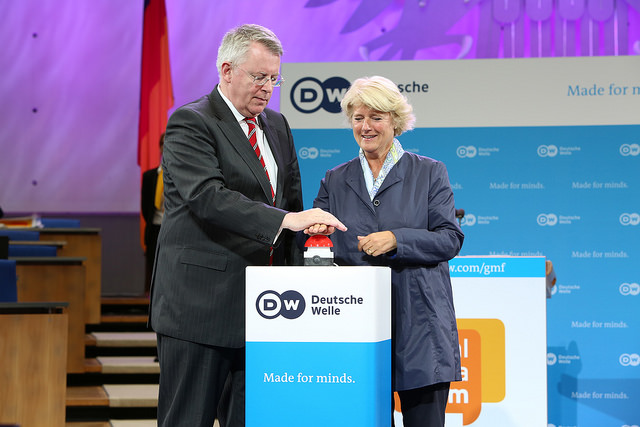German broadcaster Deutsche Welle inaugurated an expanded television programming at the Global Media Forum in the city of Bonn on Monday.
Around 2,000 guests from around the world witnessed the countdown as DW Director General Peter Limbourg and Germany’s Federal Commissioner for Culture and the Media, Monika Grütters, pressed the symbolic start button.
The new programming provides more in-depth information and background analysis, with expert knowledge to shed light on issues that affect people around the world.
Coverage includes politics and culture, business and finance, science and sports.
A new flagship program, DW News, provides the information people need to know faster and more comprehensive than ever before.
In front of an international audience of policy-makers, media professionals and journalists, Grütters said that content is the key to democratic quality and diversity, and “cannot become second-rate, despite the frenzy of technological potential and interplay of market forces.”
Grütters also warned against the dangers that digital technologies pose for freedom of opinion, on the one hand by data and information monopolies controlled by big Internet corporations, and “on the other hand through the digital self-incapacitation that is often linked to the release of personal data.”
Grütters called it a political mandate to ward off that danger.
“The values that we consider constituent for our democracy in the analog world must be preserved and defended in the online realm as well.”
Increasing demand for German perspectives
At the launch, DW Director General Peter Limbourg said that “Deutsche Welle is held in high regard around the world as a reliable source for independent, serious journalism.
“We convey German and European views on world politics, and the German perspective is becoming increasingly important.
“Hence our programming on German culture, business and science sets us apart from other international TV broadcasters.”
Furthermore, said Limbourg, the German perspective on world events should not be left to other foreign broadcasters.
DW will focus even more closely on the needs of its target audiences.
“The overwhelming majority of our audience members take advantage of our many foreign languages on offer, but English is by far the frontrunner,” said Limbourg as he introduced DW’s revamped programming.
In addition to round-the-clock programming in English, DW broadcasts TV programs in German, Arabic and Spanish, presented by internationally acclaimed journalists. DW has also expanded its network of correspondents.
Reporters in Asia and Africa will provide the latest news and background reports for regional prime time programming that presents a thematic focus tailored to the respective target audiences. There will also be regular, detailed reporting on social media trends and through DW’s social media networks.
Breaking news, background coverage and documentaries
With its four broadcasting languages – German, English, Arabic and Spanish – Deutsche Welle offers many platforms to give its global, multilingual audiences an impartial and balanced view of world events. DW takes pride in its critical, independent reporting that spotlights locally relevant topics for its target audiences, for instance in Asia and Africa.
The English-language programming encompasses feature reports, talk shows, interview formats and documentaries. News updates will be presented at the top of every hour. By investing in state-of-the-art studio technology, the programming can be interrupted at any time to accommodate breaking news.
Five TV channels
Starting June 22, 2015, Deutsche Welle’s revamped programming includes these channels with 24-hour programming:
- DW in English,
- DW (Latinoamérica) in Spanish,
- DW (Deutsch) in German for Asia and Europe,
- DW (Amerika), with 20 hours of German-language programming and four hours of programming in English
- and DW (Arabia), now with 24 hours of programming in Arabic (previously 17 with seven hours in English).
DW’s TV programming will also be available in Europe via Astrasatellite.
International viewers can also join the conversation with a new interactive app in 29 languages.






















































